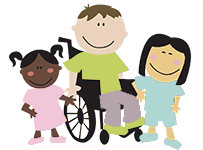 Pediatric Occupational Therapy is a science-driven, evidence-based profession which helps children develop skills for life. If you consider the different aspects of a child’s life, such as play, interacting with others, hygiene and self-help skills, you can see that these encompass the work or “occupations” of childhood. Plano occupational therapy is available for the pediatric population at Speech & Occupational Therapy of North Texas.
Pediatric Occupational Therapy is a science-driven, evidence-based profession which helps children develop skills for life. If you consider the different aspects of a child’s life, such as play, interacting with others, hygiene and self-help skills, you can see that these encompass the work or “occupations” of childhood. Plano occupational therapy is available for the pediatric population at Speech & Occupational Therapy of North Texas.
Pediatric occupational therapists provide comprehensive assessments to determine if a child needs assistance in developing appropriate life skills. If therapy is recommended, a customized treatment plan will be developed based on the child’s assessment. Treatment may target activities of daily living such as dressing oneself or feeding. Or goals may address difficulty with coordination and balance necessary for swinging, climbing stairs, or riding a bike. Treatment may also address fine motor skills needed for self feeding, dressing or handwriting. Social skills are addressed as a part of treatment to help children be more successful with interactions and understanding appropriate behaviors in different settings. Occupational therapists also help children with sensory integration disorders through strategies of self regulation and also through activities that will help modulate their sensory systems. Occupational therapists will assist families with understanding their child’s needs and make suggestions as to how activities and settings may be adapted to insure more success for the child. Family training and support are important for the success of treatment.
Depending on the needs of the child, an occupational therapist could make the following suggestions:
Promote Positive Mood and Behavior
- Use positive phrases to start routines and throughout the day, such as “Have an wonderful day” or “I am so proud of you”.
- Give affection such as a back rub or hug as a part of a routine.
- Be aware of the sensory environment. Is it too noisy or bright?
Establish Routines and organization
- Have a predictable routine for mornings, homework time, and bedtime.
- Use schedules and calendars to help a child visualize what is coming up for the day and the week.
- Have a plan for change that is consistent. “It is raining so we can choose between the library or a video”.
- Build in flexibility for weekends and special times.
- Have a place for toys and clothes and a routine for putting things away.
Promote participation and Independence
- Allow children to dress themselves as much as possible so they can practice buttoning, zipping. Let them brush their own hair.
- Let children fix their own cereal and put away dishes giving them a sense of accomplishment and responsibility.
- Build in opportunities to make choices with clothing, toys, hair styles, and activities.
These suggestions are important for children but are foundational for skills that will be important throughout life. The abilities to organize, make decisions, take responsibility, and have fun all lead to success with relationships, school, leisure activities and work. Pediatric occupational therapists are in the business of improving quality of life!
For more information about Plano occupational therapy or child development, visit www.speechandot.com. More information about occupational therapy is available at www.aota.org. Occupational therapy, as an allied health profession is often covered by insurance.

Comments (0)